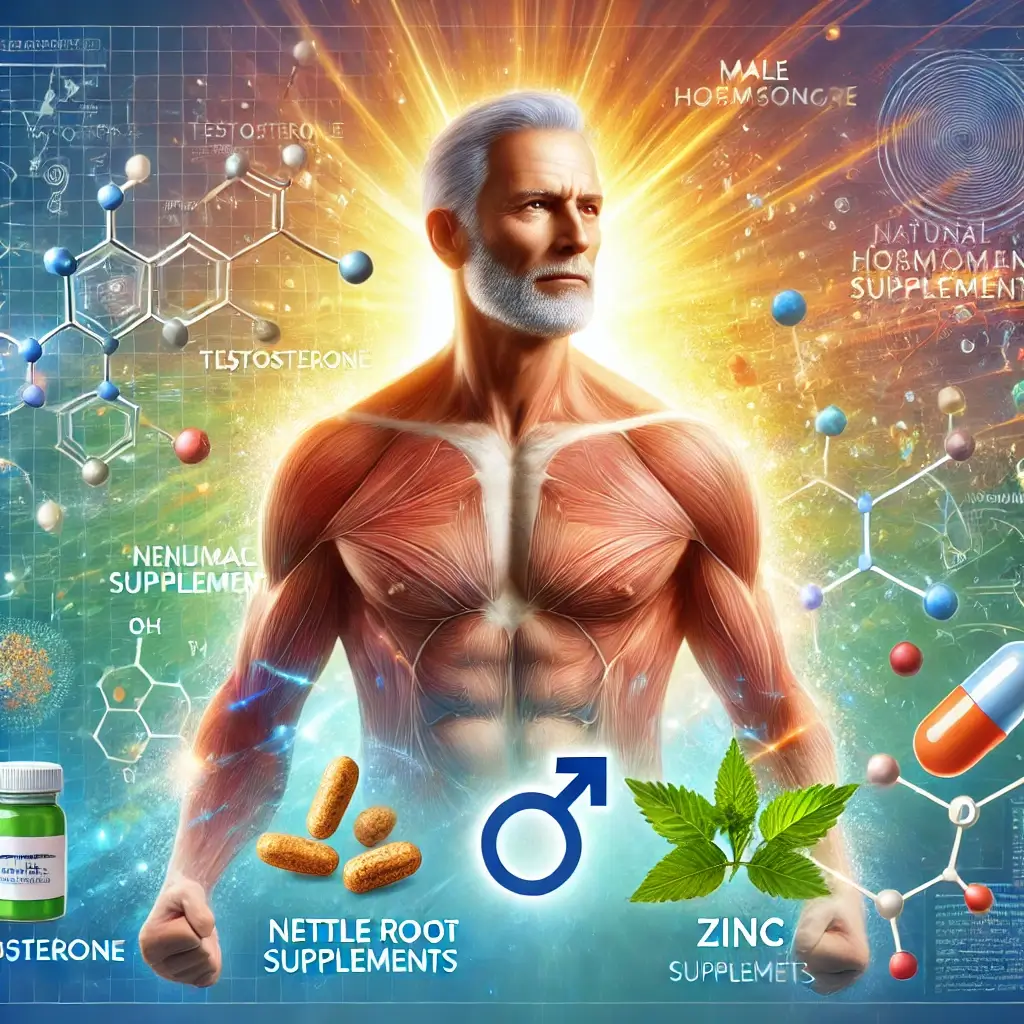Hormonal Changes in Middle Age
As men transition into middle age, hormonal changes can impact energy levels, muscle mass, and overall vitality. Testosterone, the key hormone responsible for these traits, tends to decline with age, often leading to symptoms such as fatigue, reduced libido, and difficulty maintaining muscle tone. Finding natural solutions to support hormonal health is increasingly important for men in this stage of life.
Effective Supplements for Hormonal Health
Among the many available options, nettle root and zinc stand out as highly effective, evidence-backed supplements. Nettle root boosts the availability of free testosterone, while zinc ensures optimal production of the hormone. Together, they offer a comprehensive approach to managing the challenges of hormonal decline. This article explores their individual and combined benefits, highlighting practical advice for middle-aged men looking to maintain their health and vitality.
Scientific Evidence Supporting Supplements
Nettle Root: Enhancing Testosterone Availability
Research on Nettle Root Benefits
A groundbreaking study published in Planta Medica (1997) revealed that compounds in nettle root bind to sex hormone-binding globulin (SHBG), preventing it from sequestering testosterone (Hänsel et al., 1997). This action increases the levels of free, bioavailable testosterone in the bloodstream, directly supporting functions such as muscle growth, energy, and sexual health.
Anti-inflammatory Properties of Nettle Root
Additionally, nettle root’s lignans possess anti-inflammatory properties. By reducing inflammation, nettle root creates an environment conducive to balanced hormonal function, further supporting overall health. This dual action makes nettle root a valuable tool for addressing multiple factors that affect hormonal balance.
Nettle Root and Urinary Function
Beyond hormonal health, nettle root has been linked to improved urinary function in men, particularly in reducing symptoms of benign prostatic hyperplasia (BPH). A study in Phytomedicine (2000) highlighted these benefits, showcasing nettle root’s versatility in supporting men’s health.
Zinc’s Role in Testosterone Production
The relationship between zinc and testosterone is well-established. Research published in Nutrition (1996) demonstrated that men with zinc deficiencies experienced significantly reduced testosterone levels. Supplementation restored these levels within six months, highlighting zinc’s critical role in hormonal health (Prasad et al., 1996).
Extended Benefits of Zinc
Zinc’s benefits extend beyond testosterone production. It supports enzymatic reactions essential for hormone synthesis and acts as an antioxidant, protecting reproductive cells from oxidative damage. Furthermore, studies have shown that adequate zinc levels may enhance immune function, providing additional health benefits for aging men.
Zinc and Stress Management
Zinc is also crucial in counteracting the effects of chronic stress on testosterone levels. Stress can elevate cortisol, a hormone that suppresses testosterone production. By ensuring optimal zinc levels, men can mitigate these negative effects and maintain hormonal equilibrium.
The Combined Power of Supplements
The combination of nettle root and zinc provides a two-pronged approach to hormonal balance. Nettle root ensures testosterone is readily available for physiological functions, while zinc promotes its consistent production. Together, they address both availability and synthesis, creating a robust foundation for managing age-related hormonal decline.
Synergistic Effects Beyond Testosterone
This synergistic effect can also amplify benefits beyond testosterone. The anti-inflammatory properties of nettle root complement zinc’s antioxidant functions, providing a protective effect against cellular damage and aging.
Practical Supplementation Tips
Dosage Recommendations:
Recommended Dosages
Nettle root: 300-600 mg daily, standardized for active compounds like lignans.
Zinc: 11-30 mg daily, depending on dietary intake and individual requirements.
Timing for Optimal Absorption
Timing: Both supplements should be taken with meals to enhance absorption and minimize the risk of gastrointestinal discomfort.
Supplement Forms and Options
Forms:
Nettle root is widely available in capsule, tincture, and tea forms. Capsules with standardized extracts offer consistent dosages.
Zinc supplements come in forms such as gluconate, citrate, and picolinate, which are known for their bioavailability.
Lifestyle Integration for Maximum Benefits
Combining with Lifestyle Changes: To maximize benefits, pair supplementation with regular exercise, a balanced diet, and adequate sleep. These lifestyle factors are crucial for maintaining hormonal health.
Safety Considerations
While nettle root and zinc are generally safe, certain precautions should be noted:
Nettle Root Precautions
Nettle Root: Mild digestive upset is possible in some individuals. Starting with a lower dose can help assess tolerance. Additionally, those with allergies to plants in the Urticaceae family should avoid nettle root.
Zinc Safety and Interactions
Zinc: Excessive zinc intake may lead to side effects such as nausea or interference with the absorption of other minerals, like copper. Adhering to recommended dosages is essential to avoid imbalances. Men with pre-existing medical conditions should consult a healthcare provider before starting supplementation.
Summary of Benefits
For middle-aged men navigating the challenges of hormonal decline, nettle root and zinc offer a natural, effective solution. By enhancing testosterone availability and supporting its production, this duo addresses the root causes of age-related hormonal changes. Additionally, their combined anti-inflammatory and antioxidant properties support overall health, making them valuable allies in promoting vitality and well-being.
Implementation Advice
Incorporating these supplements into a daily routine, alongside a healthy lifestyle, can lead to sustained energy, improved muscle tone, and renewed vitality. Consult with a healthcare provider to personalize your supplementation plan and ensure safe, effective use.
Research References
References
Hänsel, R., et al. (1997). “Nettle extract interactions with human sex hormone-binding globulin (SHBG).” Planta Medica. Retrieved from Planta Medica Journal.
Prasad, A. S., et al. (1996). “Zinc status and serum testosterone levels of healthy adults.” Nutrition. Retrieved from Nutrition Journal.
Safarinejad, M. R. (2005). “Urtica dioica for the treatment of BPH: A randomized, double-blind, placebo-controlled study.” Phytomedicine. Retrieved from Phytomedicine Journal.
